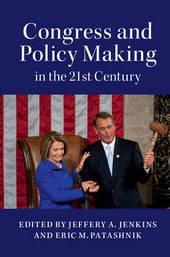
|
Congress and Policy Making in the 21st Century
Paperback / softback
Main Details
| Title |
Congress and Policy Making in the 21st Century
|
| Authors and Contributors |
Edited by Jeffery A. Jenkins
|
|
Edited by Eric M. Patashnik
|
| Physical Properties |
| Format:Paperback / softback | | Pages:350 | | Dimensions(mm): Height 228,Width 152 |
|
| ISBN/Barcode |
9781107565555
|
| Classifications | Dewey:320.60973 328.73 |
|---|
| Audience | | Professional & Vocational | | Tertiary Education (US: College) | |
|---|
| Illustrations |
10 Tables, black and white; 29 Line drawings, unspecified
|
|
Publishing Details |
| Publisher |
Cambridge University Press
|
| Imprint |
Cambridge University Press
|
| Publication Date |
15 February 2016 |
| Publication Country |
United Kingdom
|
Description
Congress is frequently said to be 'broken', 'dysfunctional', and 'weak', but how does the contemporary Congress really work? Does Congress have the capacity to solve major policy problems? Can it check an aggrandizing executive, oversee a powerful Federal Reserve, and represent the American people? Can Congress cope with vast changes in the American political economy, including rising income inequality? Congress and Policy Making in the 21st Century takes a fresh look at the performance of Congress in the domestic arena, focusing on issues such as immigration, health care, and the repeal of 'Don't Ask, Don't Tell'. With original contributions from leading scholars, this important volume examines how Congress tackles - and fails to tackle - key policy challenges in an era of growing social diversity and ideological polarization. Rich in analysis and illuminating detail, the book reveals the full complexity of the institution at work.
Author Biography
Jeffery A. Jenkins is Professor of Politics at the University of Virginia and Editor-in-Chief of the Journal of Politics. He has published more than thirty-five articles in peer-reviewed journals, such as the American Journal of Political Science, the Journal of Politics, Legislative Studies Quarterly, and Studies in American Political Development. He is also the author (with Charles Stewart, III) of Fighting for the Speakership: The House and the Rise of Party Government (2013) and the editor (with Sidney M. Milkis) of The Politics of Major Policy Reform in Postwar America (Cambridge, 2014) and (with Eric M. Patashnik) Living Legislation: Durability, Change, and the Politics of American Lawmaking (2012). Eric M. Patashnik is Professor of Public Policy and Politics and Director of the Center for Health Policy in the Frank Batten School of Leadership and Public Policy at the University of Virginia. He is also Non-Resident Senior Fellow at the Brookings Institution and an elected fellow of the National Academy of Public Administration. Patashnik is the author of several books including Putting Trust in the US Budget: Federal Trust Funds and the Politics of Commitment (Cambridge, 2000) and Reforms at Risk: What Happens after Major Policy Changes Are Enacted (2008), which won the Louis Brownlow Book Award for outstanding contribution to the literature on public administration.
Reviews'[These] essays provide two essential contributions - an emphasis on the contemporary Congress and a focus on the part it plays in policy making. They break away from dated understandings, and they push the reader to imagine the products of the legislative process, not just the process alone.' Kenneth A. Shepsle, Markham Professor of Government, Harvard University, Massachusetts 'How well does Congress address today's enormous social, economic, and fiscal challenges? Do our classic theories of Congressional behavior and operations still hold up? Patashnik and Jenkins brilliantly assemble the leading Congressional and Public Policy scholars for a wonderfully insightful, coherent, and relevant collection of analyses. I learned so much, and I can't wait to share with my students the fresh inquiries and topical case studies. A new classic is born.' Andrea Louise Campbell, Massachusetts Institute of Technology 'Most scholarship on Congress focuses on internal institutions and procedures, rather than on policy making. This volume weighs in to right that imbalance ... With so much variation across issues, the book offers a more complete portrait that goes beyond easy cynicism or blanket denunciations of congressional 'dysfunction'.' Frances E. Lee, University of Maryland 'To explain when [Congress] does - or doesn't - work, we need new theories and explanations, ones that situate Congress within the current political context. This [volume] ... demonstrat[es] that in order to understand the twenty-first-century Congress and its role in the policy process, we need to first recognize that it operates in a changed political landscape, one featuring strong presidents, polarized parties, and declining public trust.' Charles Shipan, University of Michigan '... these essays transcend assessments of institutional performance based on the number of laws passed and instead evaluate the extent to which legislators produce policies that address major domestic priorities. An analytically astute and deeply sobering account of why a nation that excels in so many other respects today struggles to govern itself.' Suzanne Mettler, Clinton Rossiter Professor of American Institutions, Cornell University, New York
|